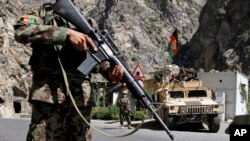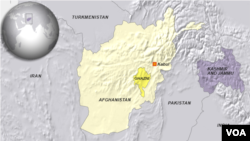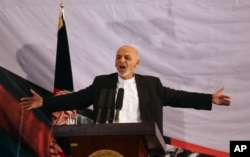Authorities in Afghanistan say heavy fighting is raging in a province southwest of the national capital where Taliban insurgents have overrun several villages and killed dozens of people. Local Afghan officials are reported as saying the advancing insurgents included masked men carrying a black flag and calling themselves fighters of the Islamic State. The Afghan insurgency has yet to comment on the latest hostilities.
Afghan security officials say fighting broke out in Ghazni province five days ago when hundreds of Taliban fighters stormed the strategic district of Ajristan.
The clashes were continuing on Friday and provincial deputy governor Ahmadullah Ahmadi says the victims included 15 who were allegedly beheaded by the Taliban.
After capturing the villages, he told VOA, Taliban insurgents burned as many as 80 houses, killed livestock and destroyed harvested wheat crops.
The deputy governor added insurgents in nearby provinces have also come to join the Taliban, and that Afghan security forces are putting up a tough fight to defend the district headquarters.
Ahmadi said that troops and police are running out of ammunition and if there is no urgent air support from the central government, the entire district is likely to fall to the Taliban.
The provincial government is reported to have lost contact with its forces in Ajristan. The main highway linking Kabul to southern Afghanistan passes through Ghazni province.
A regional spokesman for the Afghan army, however, was reported as saying Friday reinforcements had been dispatched to the district the previous day.
Insurgents have also reportedly made fresh advances in southern Helmand province, where they have besieged the key Sangin district for months and are said to be in control of surrounding villages.
Challenges facing new president
The intensity in fighting underscores grave challenges facing Afghanistan’s new President Ashraf Ghani and the national security forces in dealing with the Taliban insurgency after the bulk of US-led coalition forces withdraw from the country at the end of this year.
Critics say that lack of U.S. air cover has encouraged insurgents to attack Afghan military outposts, particularly in areas where the Taliban has traditionally enjoyed support and which are known for growing opium. Northern Kunduz province has also recently witnessed intense clashes between security forces and insurgents.
It is widely perceived that a prolonged election process and political bickering between President-elect Ghani and the election runner-up Abdullah Abdullah have encouraged the Taliban to increase attacks and exploit undermined moral within the security forces.
Meanwhile, the election commission on Friday formally presented the new president a certificate of victory in the disputed June runoff vote. The document says Ghani received around 55 percent of the 7.1 million votes the United Nations-led audit validated.
Speaking to reporters after the ceremony, the president-elect again vowed to establish a strong national unity government with Abdullah to effectively tackle challenges facing Afghanistan.






